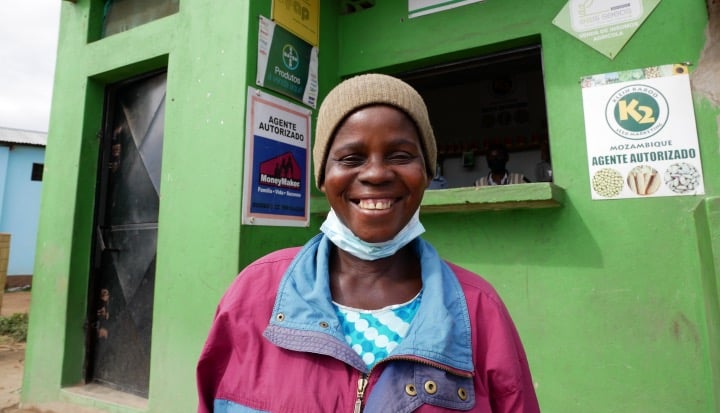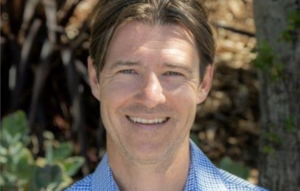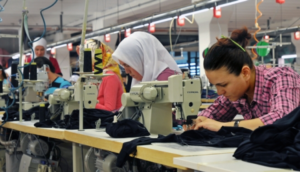Based on the evidence and experience, iDE is dramatically scaling up its work with women entrepreneurs
Flora Mostiço is a change agent in her community. At her market store, in Mozambique’s Beira Corridor, the mother of six sells affordable agricultural supplies including high quality seeds, fertilizer, and water pumps. Despite repeated cyclones that devastated the region five years ago, she also runs a successful farm, employing laborers to help with the harvest.
At the same time, she offers free business advice and demonstrates to other farmers how to spray their crops to prevent pests from destroying them. “I started with something small and now I am growing,” Flora says of her business. A role model to other up and coming businesswomen, many are now following her lead.
As a last-mile woman entrepreneur, Flora represents what many believe is one of the most effective and equitable ways to combat poverty. A large body of evidence reveals that micro and small enterprises run by women are key drivers of prosperity within low and middle-income communities.
According to a UN Food and Agriculture Organization report, projects that contribute to women’s empowerment by increasing their decision making power over income and/or resources are also significantly more effective in increasing household incomes, dietary diversity, food security and resilience to shocks and stressors than projects that do not address women’s empowerment.
In particular, results show that the number of people that see appreciable gains in their incomes increases by 5 percentage points and the number of people that see significant gains in resilience increases by 20 percentage points.
In her case, Flora has come a long way from previous years when she and her family got by on a low income. “I was a person who walked around without anything,” says Flora.
But with training from International Development Enterprises (iDE), and other market actors, which also support rural entrepreneurs, Flora became a “farm business advisor”, learned about high-yield, climate-resilient agricultural techniques; tracking spending; and, with iDE’s support, formed a business relationship with a large commercial supplier which transports her goods.
By improving local value chains and introducing new technical know-how, Flora is helping boost prosperity and wellbeing for hundreds of small-scale farmers, who buy her products, receive her training and business support, and follow her example, successfully planting and harvesting their crops, building resilience to climate change, and gradually fighting back against poverty.
While her success is remarkable, Flora’s humble beginnings are no surprise. It is well established that women and girls experience poverty in greater numbers than men and boys. This “feminization” of poverty presents itself in many forms, with women worse off when it comes to access to credit, land ownership and the impacts of climate change.
For example, in the labor economy, women are underrepresented. The World Economic Forum’s 2023 Global Gender Gap report says women have re-entered the labor force at higher rates than men globally since the pandemic, but that the gap between men and women in the workforce remains wide overall. The lowest levels of parity in participation are in the Middle East, North Africa and Southern Asia.
But rather than seeing women as victims, a growing movement within the international development sector recognizes them as the key to change. Canada, for example, has a “feminist international assistance policy” that supports targeted investments, partnerships, innovation and advocacy efforts to close the gender gap. At the same time, CARE, a global NGO, runs a large financial inclusion program dedicated to creating sustainable growth. And the Cherie Blair Foundation recently announced it was expanding its work around women’s business opportunities.
Based on the evidence, and more than 40 years of fieldwork, iDE has decided to dramatically scale up its work with women entrepreneurs and their clients. We believe that despite the challenges, business women are driving economic progress, generating employment opportunities, alleviating poverty, and enhancing living standards, beyond themselves and into their communities.
Currently, we are working across Africa, Asia and Latin America, where we are identifying the most effective entrepreneur types and developing user journeys, mapping the barriers that women face and creating action plans to systematically remove these barriers and power them towards prosperity. This comprehensive approach ensures we are doing no harm, as we help build resilient market ecosystems for communities to thrive.
Back at the market in Mozambique, Flora walks toward her store. As she weaves her way past market stalls of fruit and clothing, people in the crowd call out to say hello. She is well known here and respected by other local farmers. “I have to help my clients because they can’t stay without anything,” she says. “We have to see change in our community together.”
John Choptiany leads iDE’s global technical programming across our climate, resilience, agriculture, WASH, nutrition and design sectors. With his expertise in climate resilience, renewable energy, and environmental management, John provides iDE project teams with technical assistance on these subjects and acts as a champion for iDE’s efforts in how our projects can address the nexus of climate change and development through the creation of resilient market ecosystems to power communities to prosper. John has a strong interdisciplinary academic background and practical experience in the intersections of developmental theory and field implementation. John received his PhD in environmental science and engineering and his master’s in resource and environmental management from Dalhousie University. He has been the lead author for six scientific publications and a co-author on five others.
John Choptiany, Programs, Vice President, iDE









